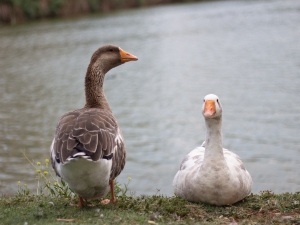
Ducks are known to be quite active and social animals, they have no problem socialising with each other and with humans that they like
So why does your duck keep sitting down you may wonder, this article looks into it.
Table of Contents
Why does my duck keep sitting down:
Ducks are much loved by many and this is why people keep them as pets and like to raise them on their property, but they do need maintenance.
If something seems to be going wrong with them, like the bird sitting down more than usual, then you would likely worry.
Here is why your duck may be sitting down more than usual:
Stress:
One of the reasons why your bird may suddenly be sitting down and may look like it is tired of life may be that the bird is simply stressed.
Ducks won’t become stressed because of the same reasons that humans will be but they will become stressed for other reasons including a change in environment, an illness, temperature changes, an infection, or a recent traumatic situation.
Your stressed bih may suddenly sit down when stressed and remain there for a few minutes.
A stressed bird may also exhibit other behavioral changes like a loss of appetite, reduce egg production, weakness, vomiting, weight loss, ruffled unkempt feathers, and a general disinterest in normal routines.
What to do:
If the bird gets up after a few minutes and carries on with its everyday activities then the bird should be fine.
If the bird continues to show signs of stress then you’d need to figure out why your bird is stressed and address this.
They are young:
If you’re raising young ducklings then this sitting may be because they simply don’t have much energy to expend.
It is common to see younger birds run around and get up to eat or drink and then sit down or lay down later on.
The birds likely used up all of their available energy running around and will need to relax for a bit after doing this
Your birds are using a lot of energy to grow at this time so they don’t have much energy to spare, they will have more energy to spare when they have stopped growing.
What to do:
If the birds are sitting down and this is the only odd behavior that you see then the birds will be fine.
If you see odd behavior in the birds, if the birds stop eating or drinking or start seeming distressed along with the sitting, then you may have to take these little birds to the vet for an examination.
Egg binding:
Egg binding is another reason why your bird may be sitting down for long periods of time. Egg binding happens when the egg that a duck produces doesn’t come out when it needs to.
The duck may start to strain to get the egg out and she will also bob her tail up and down as she does this.
Other signs of a bird who is egg-bound include constipation, lethargy, a swollen abdomen, fluffed feathers, and a less-than-normal production of eggs.
What to do:
You can check to see if your duck is egg-bound by feeling under your bird’s abdomen. Note: if you don’t feel the egg this doesn’t necessarily mean that the bird isn’t egg-bound.
If you want to be sure you can take the bird to the vet for an x-ray.
You can treat your bird at home by putting the bird in a warm environment, this will encourage the bird’s muscles to release the egg.
The temperature of the environment that you can put your bird in should ideally be between 24 to 28 degrees Celcius.
You can also give the bird oral calcium supplements to treat this condition.
If you enjoyed this article then you may also be interested in other bird related articles. Here are some articles that you may be interested in: How To Unclog A Ducks Nose, Baby Duck Raspy Breathing, Duck Raspy Breathing

